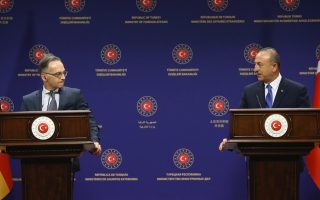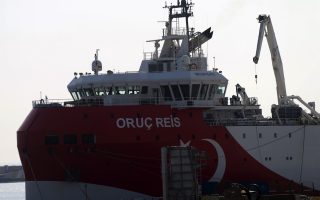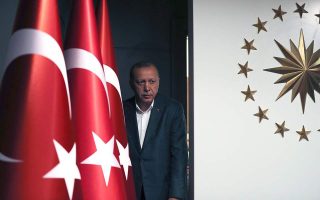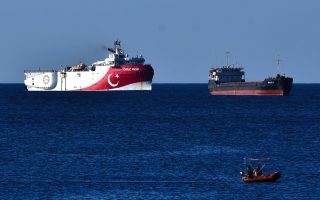35 days
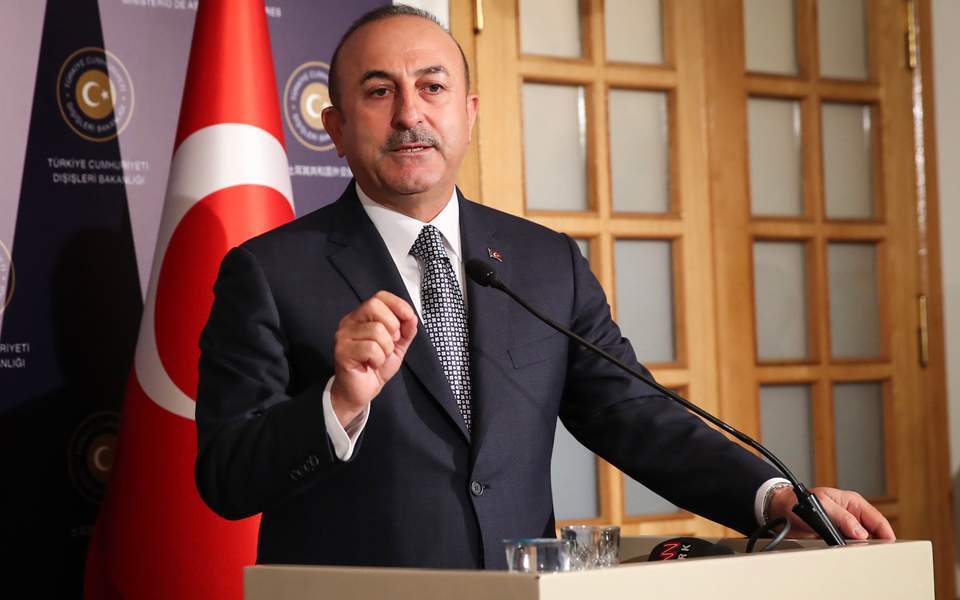
Τhe second serious crisis in Greece’s relations with Turkey that the government of Kyriakos Mitsotakis had to deal with dragged on for an usually lengthy period, namely 35 days. Here are the main characteristics of that crisis:
Objectives: Turkey, being the aggressor, set the basic parameters of the crisis. The aim of President Recep Tayyip Erdogan was to affirm Ankara’s “Blue Homeland” doctrine: Athens was basically expected to accept Turkish hegemony in the Eastern Mediterranean. Greece, on the other hand, sought to neutralize the Turkish doctrine while avoiding military conflict.
Tactics: Turkey wanted a repeat of the 1998 crisis involving Syria and Abdullah Ocalan. The now-jailed Kurdish militant leader had for years orchestrated the armed struggle against the Turkish state from Syrian-controlled territory. In the fall of 1998, Turkey upped the ante through verbal threats and serious military preparations, systematically cultivating the impression of an imminent military strike. Hafez al-Assad, the father and predecessor of Syrian regime leader Bashar al-Assad, eventually gave in to the psychological pressure of a possible war with Turkey and expelled Ocalan.
In the case of the Eastern Mediterranean, the plan sought to impose Turkish exploratory activities through the threat of war. A localized “incident” was acceptable (perhaps also desirable) as far as Ankara was concerned. A crucial factor was which side would appear to have struck the first blow.
From the very beginning, Greece chose to not engage militarily, but to respond diplomatically. In a move that raised questions among many Greeks, Athens did not stop the operations of the Turkish research vessel Oruc Reis – or it would risk a military incident which would be uncalled for in the current circumstances and would certainly be considered excessive by the international community. Greece escalated militarily, demonstrating a strong stance and readiness to respond whenever necessary.
Greece’s reaction took Erdogan by surprise. He had expected that the Greek side would be intimidated into retreat. Undecided, he let the crisis (which did not culminate in a military incident) drag on for 35 days. This made him vulnerable to diplomatic pressures. In that sense, Greece’s strong military pressure gave Greek diplomacy room for action.
Diplomacy: Many countries put diplomatic pressure on Turkey. Germany did not seem to carry the special weight to influence developments in a decisive manner. On the contrary, the more distanced US appears to have influenced matters in a catalytic manner. President Donald Trump originally pushed back the likelihood of a military incident until the US elections. Subsequently, Secretary of State Mike Pompeo and the partial lifting of the Cyprus arms embargo helped de-escalate tensions. Greece’s military exercises with France and the United Arab Emirates were also of crucial importance.
The Armed Forces: The prospect of a military confrontation tested the capabilities of each side. The Hellenic Armed Forces and, particularly, the Hellenic Navy adeptly responded to the challenge and returned to base with confidence. The credibility of the Hellenic Armed Forces was made clear to Turkey and third parties who were in the area paying close attention to developments. The Turkish Armed Forces on the other hand proved to be inadequate, possibly due to Erdogan’s purge of the military after the failed coup of 2016.
Erdogan: The Turkish president once again proved that his sense of reason and instinct for survival are stronger than his ideological obsessions. He maintained the incendiary rhetoric until the last moment. He then changed course, without caring about being consistent with his earlier proclamations. Erdogan is quickly evolving into an authoritarian Middle East figure of the Saddam Hussein or Assad type. He evidently feels more and more like the leader of a constrained Ottoman empire than of a Turkish republic. However, the Blue Homeland doctrine was not designed to be depicted on maps only. Its adherents want it to be advanced with actions. The Turkish Armed Forces proved incapable of fulfilling the Turkish strongman’s aspirations.
New alliances: A broad regional alliance has emerged that extends from France to the UAE. The common reference point of all these states is their opposition to Erdogan’s neo-Ottoman ambitions. Greece and Cyprus have not operated in such a favorable international environment since 1974.
Danger lurks: The entire crisis was a rehearsal for what could follow, which could be worse. The withdrawal of the Oruc Reis was a tactical move. Seeing Greece’s references to international law, Erdogan will emphatically insist on the demilitarization of the eastern Aegean islands, which is stipulated by two international treaties. This will in due course give him the ability to deplore the Greek stance and start all over again. Particularly if Joe Biden wins the US presidential election, the crucial period for a repeat of the crisis will be between November 3, 2020 and January 20, 2021.
Angelos Syrigos is a New Democracy MP and associate professor of international law and foreign policy at Athens’ Panteion University.
